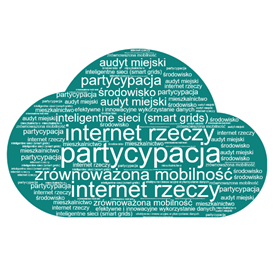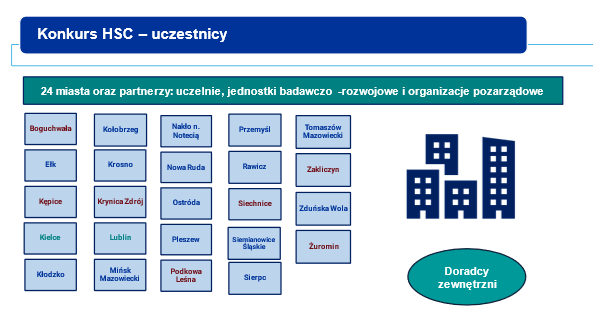On July 18, 2017, the former Ministry of Development (current Ministry of Development Funds and Regional Policy) announced a grant competition addressed to local government units entitled: "HUMAN SMART CITIES.Smart cities co-created by residents” (HSC).

Objectives and progress of the competition
The main goal of the competition was to create, using intelligent solutions, the city as a livable space for which residents are co-responsible too.
The competition was addressed to small and medium-sized cities, in particular those losing their socio-economic functions. Detailed rules of the contest were specified in the Regulations (PDF 217 KB).
One of the key assumptions of the competition was to strengthen the capacity of local government units to create sustainable mechanisms of public participation.The organizer's goal was to disseminate the results of the competition and promote good practices among various stakeholders and other cities with similar conditions.
The competition was divided into two stages. In the first stage, the applicant prepared and submitted to the Ministry a project fiche, which synthetically described the project idea and the proposed activities in the field of smart solutions for the city.
A total of 115 projects were submitted, and 108 of them entered the second stage of the competition.
During the second stage of the competition, applicants whose projects were selected in the first stage received substantive support, including:trainings, workshops, conferences and individual expert advice in order to prepare a grant application.The second stage of the competition focused on preparing a project concept that would solve a specific problem in the city.A total of 78 applications were submitted, and 69 of them passed for substantive evaluation.
A manual has also been prepared for applicants, gathering information and tips important for the implementation of intelligent solutions in the areas such as: urban audit, social participation, city management, environment, urban mobility, as well as a number of examples and good practices that illustrate the development trends of modern cities - download here (PDF 2 MB).
Implementation and results
The competition ended on February 19, 2019, with grants being awarded to 25 projects, divided into three categories of cities (2 large cities; 15 medium-sized cities; 8 small towns).
Eventually, 24 cities started implementing the projects and received a total of approximately PLN 35 million in subsidies from EU funds (85%) and the state budget (15%).The last projects ended on December 31, 2022.
The projects were implemented in cross-sector partnerships - in cooperation with university partners, research and development units and entities representing the third sector.At the stage of project implementation, cities could also use the support of external experts provided by the Ministry.

You can read about individual projects here.
Thanks to the competition, the topic of a smart city - usually associated with large urban centers - gained a chance to be implemented in medium-sized and small cities. The great interest of local governments showed how important it was.
Each of the 24 cities implementing HSC projects has prepared innovative solutions that serve their residents and improve their quality of life. In the area of the environment, these include, for example air quality monitoring systems, a waste management system with underground waste tanks with software, tools for detecting acoustic disturbances and hydrological and electromagnetic threats. In the area of sustainable mobility - a parking policy has been developed in cooperation with city residents and a system of bicycle paths has been designed.The results of the HSC competition also include open data services combined with tools enabling the collection of data from residents (e.g. regarding the identification of architectural barriers for the disabled, illegal landfills, barriers to moving around the city on foot or by bike).
In the case of HSC projects, what deserves special attention is the wide involvement of residents in the decision-making process, using various participatory tools - participatory cafes, workshops, online surveys, mobile points (where any interested person could approach and express their opinion on issues they consider important forcities), geosurveys or mobile applications using crowdsourcing.

HSC projects were of a pilot nature.Innovative solutions tested by grantee cities have a chance to become models for other cities in the future.Each city that received the grant prepared a "good practice manual" describing the experiences gained during the project, both positive and more difficult ones.You can read the good practice manuals here.
It is worth emphasizing that the projects implemented in the HSC competition were also appreciated by experts. The implementation of the project "Active seniors in digital Zakliczyn" was noticed by the Jury of the "Innovative Local Government" competition, organized by the Local Government Service of the Polish Press Agency and aimed at promoting innovations implemented by local governments, based on modern technologies.In February 2020, the Zakliczyn commune became a finalist of the first edition of this competition in the category of urban-rural communes.
During the 14th edition of the Smart City Forum (organized in June 2022 in Wrocław), the City of Kołobrzeg received a statuette as part of the Smart City Awards competition.Kołobrzeg was the winner of the competition in the category: "Smart City up to 100,000 inhabitants".The award was granted for the implementation of the idea of a smart city as a part of the project "Kołobrzeg. Human, Part and Space”.
In the 16th edition of the Forum (held at the turn of May and June 2023 in Wrocław), the award in the category of cities from 100,000up to 300,000 inhabitatnts, was granted to the City of Kielce for consistent, long-term activities in the field of implementing innovative solutions.

